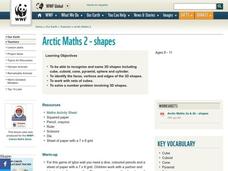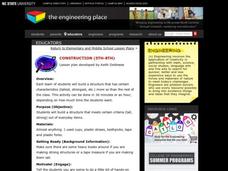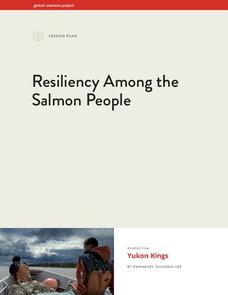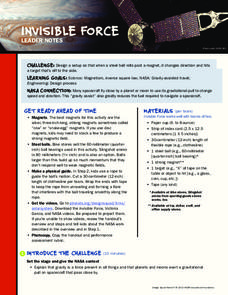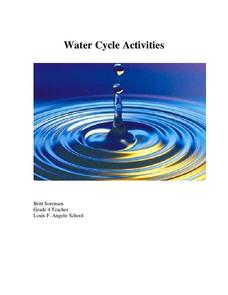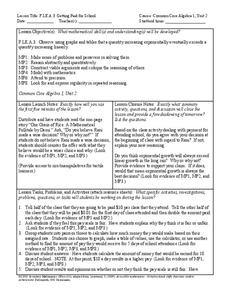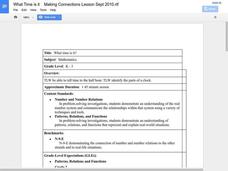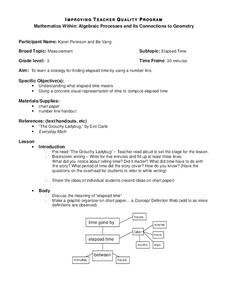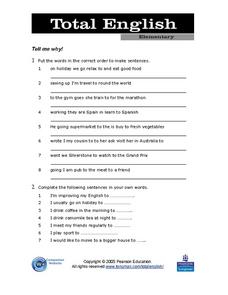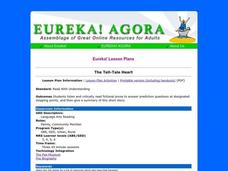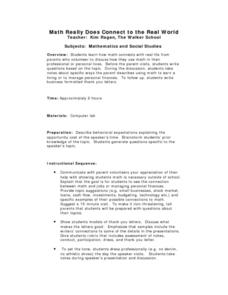US Institute of Peace
Identifying Your Conflict Style
How do you handle conflict? Individuals look inward to determine their own conflict style through group discussion and a short quiz. The sixth installment in a series of 15 conflict management lessons examines how our feelings and...
US Institute of Peace
Peacebuilders in Action
What contributions have great peacebuilders made to our society? Civic-minded scholars take an in-depth look at people who have made a difference world-wide during the 12th lesson in a 15-part series. After researching facts about their...
Smithsonian Institution
Be a Food Detective
What are packaged food products really made of? This instructional activity will prompt your learners to consider and investigate the source of ingredients in their food. They begin by breaking into groups and analyzing food labels by...
Houghton Mifflin Harcourt
Songwriting Skill - Finding Your Voice: The Academy Is - “About A Girl”
The seventh in a series of nine exercises focusing on songwriting models for young lyricists on how to find and develop their unique voice. Class members suggest songs that they feel sound authentic and contrast the wording with songs...
World Wildlife Fund
Shapes
Investigate the properties of three-dimensional figures with this Arctic-themed math activity. Beginning with a class discussion about different types of solid figures present in the classroom, young mathematicians are then given a...
North Carolina State University
Construction
Engineering design projects serve as great opportunities for collaborative problem solving. In this case, students work in small groups designing, building, and eventually testing a structure that meets a teacher-specified objective. It...
Historical Thinking Matters
Rosa Parks: 5 Day Lesson
What led to the success of the Montgomery Bus Boycott, and how might historians approach this question differently? This rich series of lessons includes a short introductory video clip, analysis of six primary source documents, and...
Global Oneness Project
Ancient and Modern Worlds
The old aphorism, "The road to Hell is paved with good intentions," might well serve as the title for a resource that asks viewers to consider the plight of the people of the Gamo Highlands, an area in southwestern Ethiopia. These...
Global Oneness Project
Resiliency Among the Salmon People
Is losing cultural traditions the cost of social progress, or should people make stronger efforts to preserve these traditions? High schoolers watch a short film about the native Yup'ik people in Alaska and how they handle the shifts in...
PBS
Invisible Force
Investigate invisible forces. Young engineers design a setup that changes the direction of a steel ball using a magnetic force. The purpose of the setup is to model the gravitational pull of spacecraft by planetary bodies.
Chicago Botanic Garden
Accessing Prior Knowledge: Global Climate Change Survey
Begin a unit on weather and climate change by assessing prior knowledge of the topic. Learners respond to a survey with questions that ask what they think causes climate change, the effects of climate change, and if it is important to...
Curated OER
Water Cycle Activities
Explore the water cycle in all aspects with a resource packed full of activities and lessons. The 37-page packet comes with vocabulary, a game, writing prompts, printables, and opportunities to journey through the stages in the water...
Howard County Schools
Getting Paid for School
What if you were paid to attend class? What kind of payment schedule would you choose? Learn how exponential functions will eventually exceed linear functions by comparing two different payment schedules for attending class.
University of California
Principles vs. Practices
Have you ever wondered what your own World Order would look like? Scholars use primary and secondary documents as well as video clips to investigate and analyze the Cold War. Using the sources, the principles and practices of nations...
Curated OER
Fraction Clocks
First graders use a clock to practice telling time and using fractions. They review the different parts of the clock and play a game using time. They help each other with telling time.
Curated OER
ADULT ESOL LESSON PLAN--Lesson 2--Time and Money
Students explore the concept of clock time in the United States. They employ a list of vocabulary words to assist them in interpreting clock time. In groups, they practice telling time with regular clocks and digital clocks.
Curated OER
What Time is It?
Students explore time by completing worksheets. In this time-telling lesson, students utilize images of clocks and determine what time they read. Students answer more clock questions with a Smart Board and complete a clock worksheet with...
Curated OER
Agriculture in Idaho: Its Importance And Development From Historical Times To the Present
Fourth graders examine importance agriculture is in their own lives and about its importance in the history of Idaho from its beginnings through the present.
Curated OER
Measurement
Third graders explore a strategy for finding elapsed time by using a number line. They identify what elapsed time means. Students investigate a concrete visual representation of time to compute elapsed time. They read, " The Grouchy...
Curated OER
Sentence Order: "Tell Me Why!"
In this sentence order worksheet, students rearrange words to correctly put sentences together. Then they complete sentences in their own words. There are sixteen questions to complete.
Curated OER
Steps to a Short Story
Young scholars write and publish a short story using KidPix computer software. They discuss the basic elements of a story, observe a demonstration of how to use KidPix, select a setting and characters, and print out their background...
Curated OER
The Tell-Tale Heart
Readers listen and critically read fictional prose to answer prediction questions at designated stopping points, and then they give a summary of the short story. This lesson is ideal for English language learners developing English...
Curated OER
Math Really Does Connect to the Real World
Students listen to parent speakers who discuss how they use math in their professional or personal lives. They take notes and write business form thank you letters.
Curated OER
Catching on to Cooperation
Students give examples of when they need to cooperate--work together--with others.






